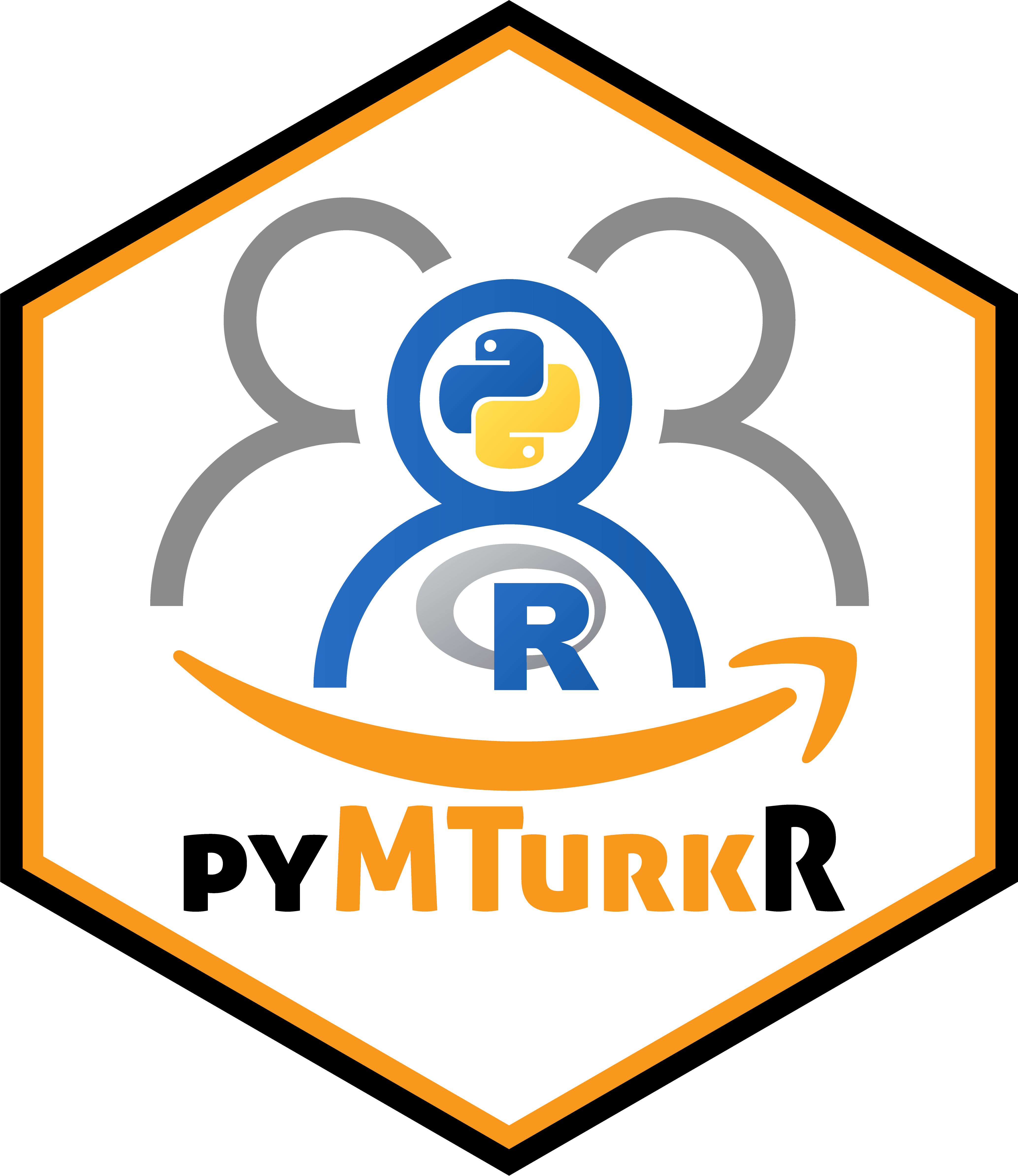A Client for the 'MTurk' Requester API.
pyMTurkR: A Client for the MTurk Requester API 
pyMTurkR is an R package that allows you to interface with MTurk's Requester API.
pyMTurkR provides access to the latest Amazon Mechanical Turk (MTurk) Requester API (version '2017-01-17'), using reticulate to wrap the boto3 SDK for Python. pyMTurkR is a replacement for the now obsolete MTurkR.
Using this package, you can perform operations like: creating HITs, updating HITs, creating custom Qualifications, reviewing submitted Assignments, approving/rejecting Assignments, sending bonus payments to Workers, sending messages to Workers, blocking/unblocking Workers, and many more. See the pyMTurkR documentation for a full list of operations available.
Why make this?
pyMTurkR was created because on June 1, 2019 Amazon deprecated the MTurk API (version '2014-08-15') that MTurkR was using, rendering it obsolete. This package was created to maintain MTurk access for R users while migrating to the new MTurk API (version '2017-01-17').
pyMTurkR is not a native R language package. It uses reticulate to import and wrap the boto3 module for Python. Cross-language dependency is not necessarily a bad thing, and from the user perspective there is probably no difference, besides a few extra installation steps. Welcome to the wonderful world of R-python interoperability.
Installation
1. Install python and pip
1.1. Install python 2 (>= 2.7) or python 3 (>= 3.3) (download page)
1.2. Install pip for python
- Windows users: see "Installing with get-pip.py" here
- Mac users: run
sudo easy_install pipto install pip
1.3. Install reticulate for R
install.packages("reticulate")
1.4. Check that reticulate can now find python. You may have to restart RStudio.
reticulate::py_config()
You will see information about your python configuration, including one or more system paths where python is installed.
1.5. Check that pip can be found
system("pip --version")
You will see something like pip 18.0 from /usr/local/lib/python2.7/site-packages/pip
2. Install boto3
2.1. Find the default python path that reticulate is using
reticulate::py_config()
Take note of the path in the first line (e.g., "/usr/bin/python").
2.2. Find the path that the system pip command is using
system("pip --version")
For example, in "pip 18.0 from /usr/local/lib/python2.7/site-packages/pip" the python path is "/usr/local/lib/python2.7". If the path here does not match the py_config() path, then you may need to manually set the path using use_python().
reticulate::use_python("/usr/local/lib/python2.7", required = TRUE)
You may have to restart RStudio before setting the path if you have run other reticulate operations.
2.3. Install boto3 using pip
system("pip install boto3")
Or alternatively, run this command in the system terminal (sudo pip install boto3 for Mac users).
2.4. Check if you can now import boto3. You may have to restart RStudio.
reticulate::import("boto3")
For additional install options, see "Installing Python Packages" in the reticulate docs.
3. Install pyMTurkR
3.1. Finally, you can install pyMTurkR.
install.packages("pyMTurkR")
Or the development version
devtools::install_github("cloudyr/pyMTurkR")
Usage
Before using the package, you will need to retrieve your "Access" and "Secret Access" keys from Amazon Web Services (AWS). See "Understanding and Getting Your Security Credentials".
Set AWS keys
The Access and Secret Access keys should be set as environment variables in R prior to running any API operations.
Sys.setenv(AWS_ACCESS_KEY_ID = "MY_ACCESS_KEY")
Sys.setenv(AWS_SECRET_ACCESS_KEY = "MY_SECRET_ACCESS_KEY")
Set environment (Sandbox or Live)
pyMTurkR will run in "sandbox" mode by default. It is good practice to test any new methods, procedures, or code in the sandbox first before going live. To change this setting and use the live environment, set pyMTurkR.sandbox to FALSE.
options(pyMTurkR.sandbox = FALSE)
Examples
library("pyMTurkR")
Sys.setenv(AWS_ACCESS_KEY_ID = "ABCD1234")
Sys.setenv(AWS_SECRET_ACCESS_KEY = "EFGH5678")
options(pyMTurkR.sandbox = FALSE)
AccountBalance()
Changelog
For development updates see the changelog.
Package maintainer / author
pyMTurkR is written and maintained by Tyler Burleigh.
Additional credits
pyMTurkR borrows code from MTurkR, written by Thomas J. Leeper. pyMTurkR's logo borrows elements from Amazon, R, and python logos; the "three people" element is thanks to Muammark / Freepik.



